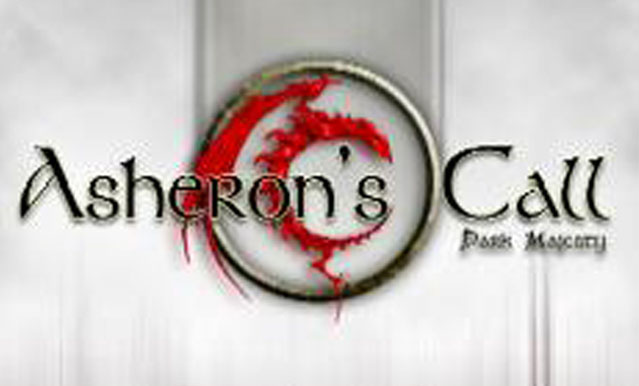
Expansion – October 2001 – Dark Majesty
A Brief History of Marae Lassel
Marae Lassel, or “Sheltering Isle,” was the name that the original denizens of Asheron’s world gave the island. These people, the Empyrean Yalain, maintained the island as a nature preserve and religious retreat, and a Protector of Marae was appointed every decade to preserve the island’s habitat.
It’s interesting to note that records recovered from long undisturbed underground archives indicate that a scandal erupted near the beginning of the reign of Emperor Caerlin I, prior to the Empyrean Shadow War.
According to the records, a young priestess named Adja testified that the Protector of Marae at the time was not doing her job. In fact, the Protector was actively destroying the island’s habitat. At the conclusion of a long public trial, the Protector was stripped of her position and noble title. Her name was expunged from all official records of the Empire.
When the Olthoi invaded, they were able to spread across the land quickly through a worldwide series of portals, called the Empyrean portal network. To quell the lightning-fast spread of the Olthoi, the Empyreans dismantled the Empyrean portal network and escaped to a world in-between dimensions. One Empyrean, Asheron, remained behind to discover a means to defeat the Olthoi.
As a result of the dismantling of the Empyrean portal network, various outlying islands were cut off from Dereth, including Marae Lassel.
Marae Lassel’s “re-emergence” can be traced to a person named Candeth Martine. History says that Candeth was a member of the Dereth Exploration Society. The Society’s leader, Mikael Alayne, betrayed Candeth to the Virindi, a powerful and capricious race of magic-users. The Virindi performed horrible experiments on Candeth, breaking his mind and mutating his body.
Eventually, Candeth escaped. He has created a portal from Dereth to Marae Lassel, where he intends to avenge the transgressions against him by destroying the Virindi infrastructure located on the island.
There are three human towns in Marae Lassel. Humans are newcomers to Marae, and cluster along pacified coastal areas suitable for relative new adventurers. Just watch out for the highwaymen that have come from Bandit Castle and MacNiall’s Freehold.
The monsters will get tougher as people venture further north, and access to the central Marescent Plateau is restricted by level. There are two Tumerok towns in these wilderness areas. They’re quite different from one another, for reasons that will be revealed soon enough. One of the Tumerok towns is a virtual fortress built up on the Plateau, and the other can be found hidden deep in the wetlands along the west coast.
Blood Brothers by Allan Maki
A dust cloud spun just outside the ring of the dim red-orange glow of the campfire. Wind rustled the leaves of a nearby tree and reminded me that the seasons were changing. Somewhere in the night a pod of Carenzi growled one another down. Img tumerok.jpg
Steam rose in thin tendrils from the soup cupped in my hand while I sat thinking of my home in Cragstone. A chill ran down my spine as my host slipped between the shadows cast by the firelight to take the seat across from me. His fur, dyed the color of the dying embers in the fire, blended all too well with the eerie glow. For three days we had traveled along the plateau and into the valley, for three nights I had watched in silence as he studied the dark horizon, silent and vigilant.
He was a Tonk Ona. Tumerok Scout, in our vernacular. I had been amongst their people only a week. My time there was spent speaking with their Tah, about the Olthoi, or Wharu as the Tonk named them.
I had been trying to learn as much of their language as I could since my trip from the town of Redspire, but the learning was slow. They spoke our language well, aided I think by the presence of three Isparian settlements on this same Isle. The Tah had asked what the growing presence of we Isparians meant.
In the simplest terms that I could muster I recounted how the portals had arrived on the main body of Dereth. His reply was always the same, mutterings about Atua ngamaru and a tailless brother. I have yet to learn what these things he spoke of are but that was the purpose of this trip.
My guide has been eying me warily as I drift to sleep each night. I do not think that he mistrusts me, but it appears the task he has been set makes him nervous. They are unused to the intrusion of the humans, especially those that smell of Wharu so strongly.
I had arrived in the akiekie of Timaru wearing the shaped head of an Olthoi. They were unimpressed and thought at first that I was a servitor of the Olthoi. After much protestation to the contrary they accepted that I was indeed Isparian. They called me Ispar Antiusona. I have gathered that they consider me a scout, much like my companion, and that I come from the tribe of Ispar. Fascinating concept.
Tonight has begun as every other has since the beginning of our journey. Only tonight there are no drumbeats that hearken away the spirits of the Wharu. We passed through the last vestige of their Buadren circles. My companion is a bit more jumpy but maintains his ever-watchful eye.
I will make sure to record the events of this evening with care once daylight allows. For now I think that I shall sharpen my okane and prepare for another fitful rest.
“Ispar Antiusona?” Aun Kolaona broke his silence of three nights. “Why have you not asked where we travel?”
“I was under the impression that you would rather not speak to me, Kolaona.” He regarded me with an inquisitive cock of his head.
“You should not address me so. I am Aun Kolaona. We have not bled together yet, and as such, are not Buhdi. . . ” he paused. “Your people are very different, like what our brothers the Hea have become.”
“I understand, I am sorry.” I responded.
“Do you wish to know where we go?”
“If you are willing to impart that knowledge to me, Aun Kolaona.”
“I will tell you.” He nodded and reached into his pack to produce two apples, onga as they call them. “Eat with me.”
As I took a bite from the apple he smiled, a toothy grin that twisted the tattoos on his face into an amusing mask of joy. He bit into his apple and I waited for his tale to begin.
“I am no Aua, who have been taught by the Nuuani of Palenqual, but I have learned well the stories of our brothers and sisters, the Hea.
“We are of the same blood and life, holding dear the customs of what was once our home. We came to Palenqual from our home and saw the Wharu walk. We fought them and our Tah killed the Wharu’s mistress. That was a time when we Aun and Hea were one, before the coming of the Atua ngamaru.”
The words spat from his lips like a poison pulled from a wound. His eyes seemed to burn with the voracity of the fire before him, and he was lost then, remembering for a long moment. I made no effort to break the memory.
“We were–are–brothers, the Hea and Aun Tonk. We lived together all our lives as a unified Tonkamu. Then the Atua ngamaru floated to our Tahs.
“They tried to poison our beliefs and disjoin us from our stand against the Wharu. They offered your land, where the Ispar live, as the fruit of their gifts. But they offered that which they did not own.
“You gave a gift and were in turn given your Okane.” He motioned to the dagger gifted by his Tah. “The Atua ngamaru wanted nothing but offered change. Our Tahs wanted nothing of them, and sent them away. But they were not driven away.
“They instead turned to a Puh, a Bahka, cast out of the Hea Xuta for transgression against the Tah. They poisoned his body and took his tail. They changed his face and body, to be more like. . . ” He stared hard at me then, and though warmed by the fire and the stew I felt cold. The hatred that he felt runs deep indeed. “. . . you.” He finished and allowed the chilling air to remain for another series of moments.
He discarded his apple into the darkness where it landed with a thump. Seconds after there came a rustling of feathers, a gaggle of Siraluun no doubt thinking it something alive. Sounds of displeasure exploded, and then faded as the Siraluun retreated back into the night.
“Our kin of the Hea Xuta were unaffected for some time. Then came the return of the Puh. He wrested control from the Hea Tah and replaced him. Gifted by powers of the Atua ngamaru he displaced all that would stand before him.
“Spitting poison words into their minds he corrupted their beliefs and told them of the Ispar Dereth. Bringing treasures and tales of your land, he changed them. Then they went unto the Atua ngamaru and asked to have their tails removed.
“Now we are two Xuta. Separate for the first time.
“They wish to leave Palenqual and see your Dereth.”
He crept across the fire then and came to sit next to me. I met his stony stare with the same resolve I met all such stares.
“I take you to their border so you can meet them.”
I had not been prepared for those words. I had asked to learn more about their people and had been passed to another tribe. Dumbfounded, I spoke.
“Have I done wrong?”
“No, Ispar Antiusona.” He shook his head and looked into the fire. “We love our brother/sisters. We wish you to know them as well.” I watched as he rose and made his way across from me again. He wiped a tear from his eye as he sat. “We are one but no longer whole.”
“I think I understand, Aun Kolaona.”
He nodded to me then and looked back into the darkness outside the ring cast by our fire.
“Rest, Ispar Antiusona, tomorrow we breach the lands of the Hea Xuta. I will take you no further once we come to their place. I fear their poison may enter me.”
He did not look back as I nestled myself into my blanket and sheathed the okane. Drifting to sleep, it clicked within my head: Atua ngamaru. Floating demons. Cloaked ones. Virindi. The Tumeroks had fared the same as the Lugians.
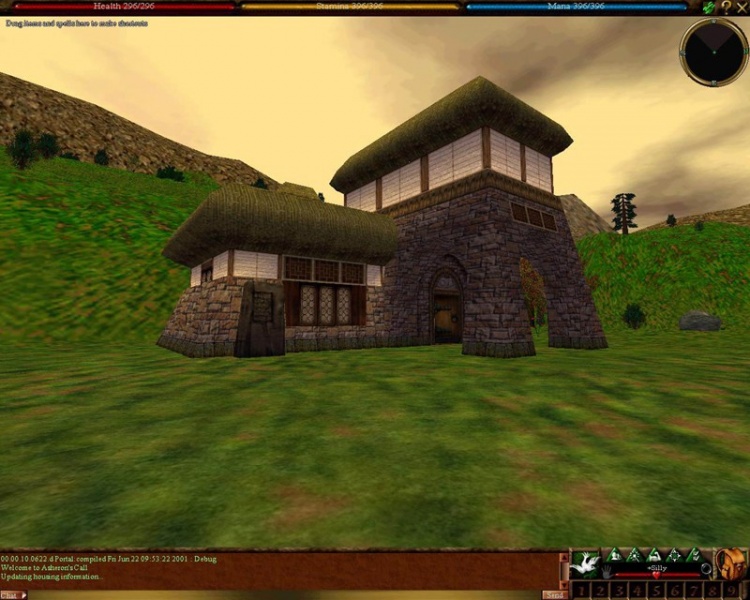
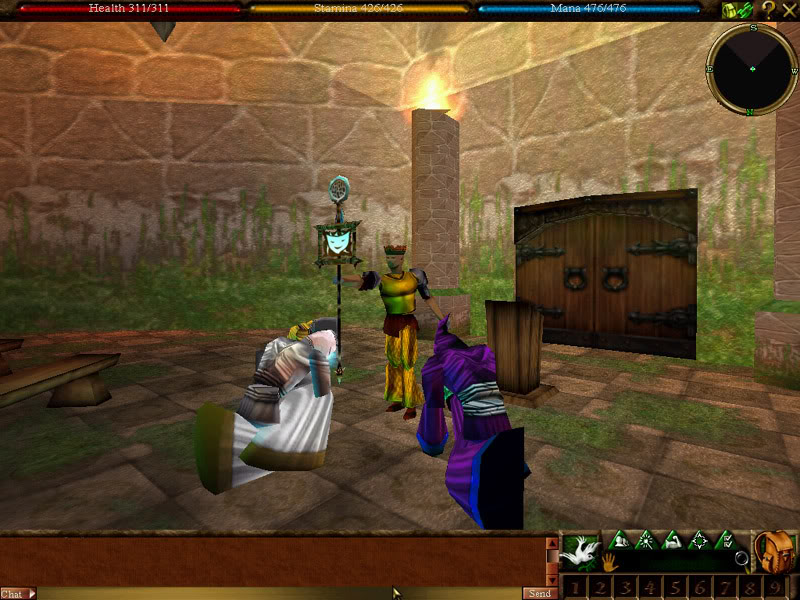
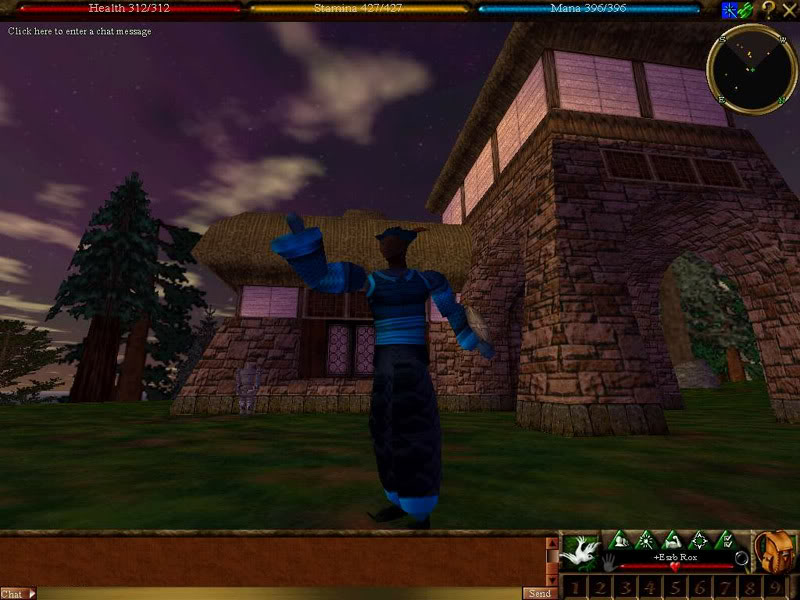
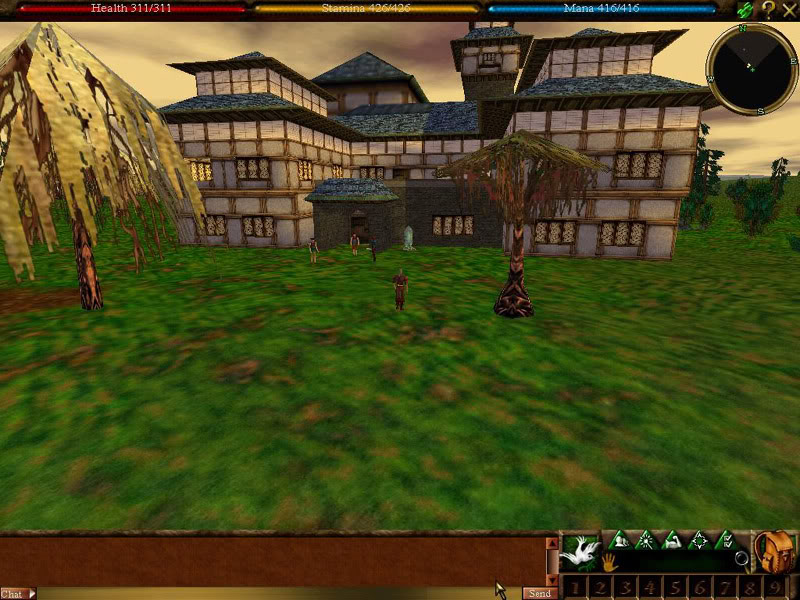
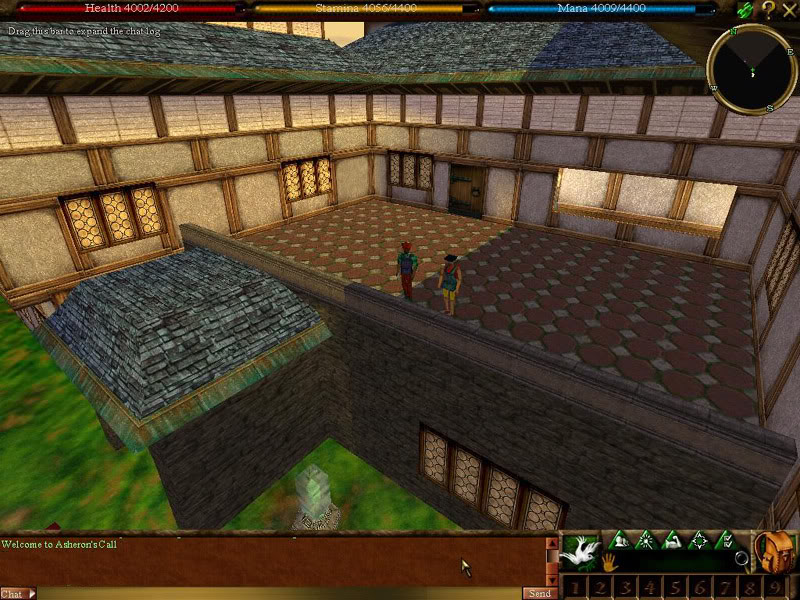
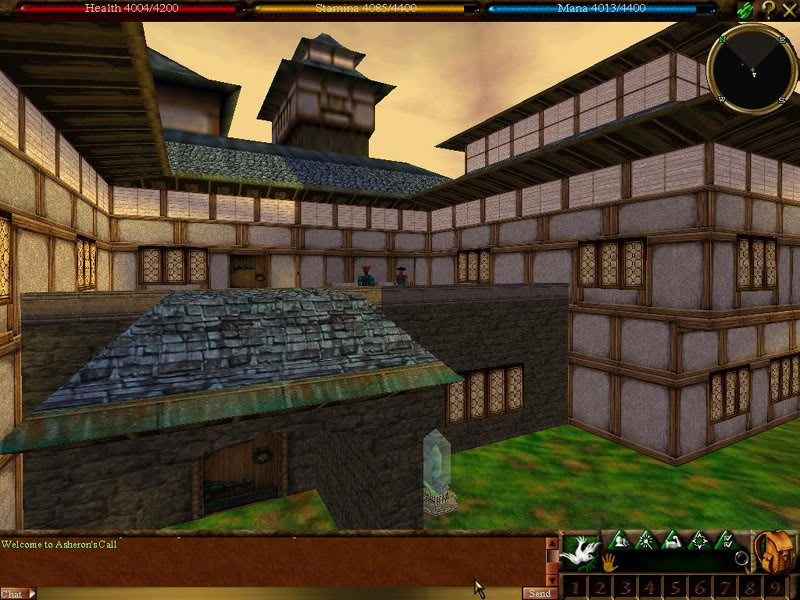
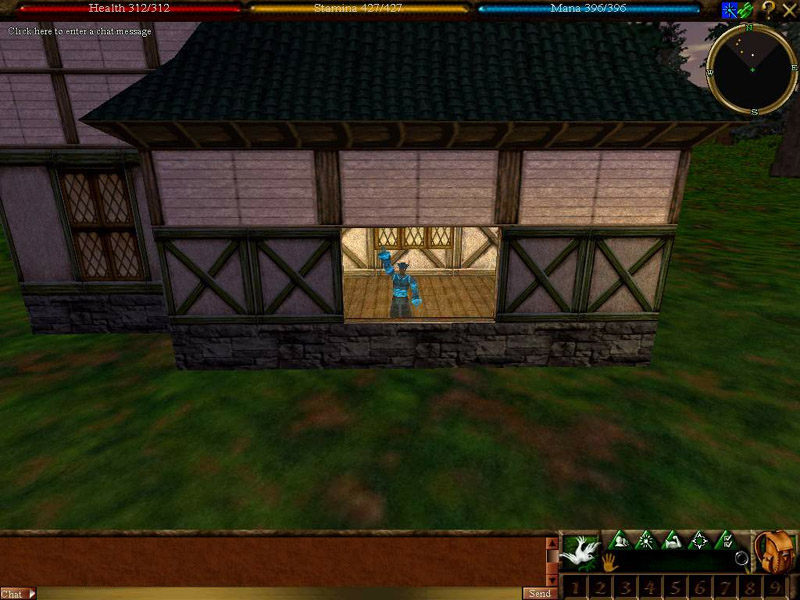
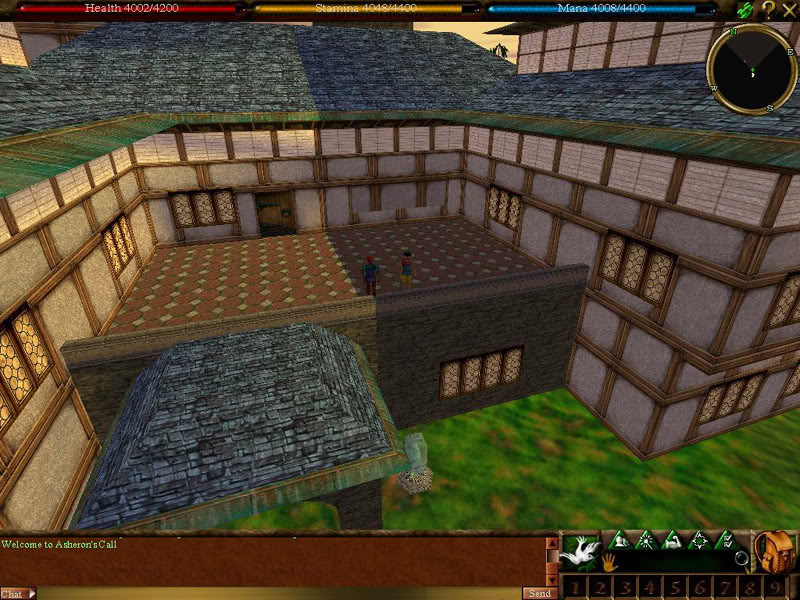
Desinence
The doors, silver-gilt carved sapphire stretching floor to ceiling — impossibly expensive and inconceivably heavy — parted smoothly and soundlessly before him. To one side, a deputy in heavy raiment snapped to, his chin lifting and his eyes flashing briefly. In response to the man’s silent magical command, the temperature in the sea-colored crystal chamber dropped precipitously. His breath occluded before his own eye.
Such was tradition. Imperial Justice had entered the room. Imperial Justice was cool and passionless, saw truth as if through pure ice, and was inexorable as a glacier’s fall.
It was a bitter irony, he reflected as he strode into the gallery. The Viceroys of Dericost had first made tradition of lowering the temperature during such proceedings. It had been a tradition of the Old Lords of the Ice Throne. The subjects in those lands reflexively became more docile in the chill; more accommodating of their fate. The hands of Dericost yet reached from the grave to fold the world’s destiny on to new courses.
At his next step, a Hieromancer in the wings heralded his entrance. “Rise! His Most Serene and Dignified Majesty, Emperor Caerlin! Rise!” he bellowed.
Skirts and cloaks rustled in the silence. Six figures rose from seats just behind the carved-ivory rail of the gallery, silhouetted by mists rising from the warm walls into the sudden bitter cold of the air. They bowed to him, master of the Cerulean Throne, Emperor of the Thousand Seas, undisputed ruler of the world of Auberean.
The ponderous weight of his various titles was actually quite embarrassing at times like these. Sometimes he suspected that his subjects gave him more accolades every year merely to suggest the ever-increasing glory of their own culture.
“We are flattered. Be seated,” Caerlin said, cringing inwardly at the necessity of the Imperial Plural. He moved to the center dais, three seats to the left, three to the right. He stood in the middle, gazing at the floor below the gallery, and gestured with his right hand. “You who have brought the charges to Our attention, rise, and call upon the accused.” He pulled his hands back into the folds of his robe, laying his arms across his barrel chest so that the seams disappeared. From below, he himself would appear as a form carved from a single piece of sapphire and silver.
“Ai, Your Majesty.” The woman — barely more than a girl, really — stood with slow dignity, like a ribbon unknotting itself. With her motion came a chorus of tiny silver bells, bone beads clattering one upon another, and the hollow ringing of wood upon wood. Peripherally, he noted her long train of hair slipping down to cover her exposed lower back, black water falling over rocks.
There was uncomfortable murmuring to the left, but tradition held that Imperial Justice must keep its eyes on the matter at hand. Until the accused was presented, that happened to imply the floor where she would appear. Later, he would reprimand them for objecting to the Lady of Ithaenc’s ceremonial costume. His Empire was about deeds, not dress.
“Bring in the accused,” the Lady said, clasping her hands before her stomach. The simple metal hoops adorning her arms fell to her wrists in a pile of silver song. Someone swallowed, loudly, as this revealed a few of the fresh scars upon her flesh.
Silently, the doors to the floor below the gallery swung in. The accused marched out at a deliberate pace, her chin high, sea-grey eyes flashing, heading towards the circle carved in the center of the floor. Her platinum hair fell only to her shoulders; long enough for court, yet short enough to be held away from her face with simple plaits.
Caerlin’s eyes burned briefly as he summoned Majesty to his voice. “Protector of Marae,” he said, the modulated tones carrying powerfully throughout the baroque carvings of the room. All eyes were drawn magnetically to the source of the voice–from the gallery, from the observers’ wings, and from the elegant young woman on the floor below. A minor glamour, but still effective.
“You were summoned before Us for judgment. You elected to represent yourself, against the testimony of the Lady of Ithaenc. These proceedings have been completed. Are you now prepared to meet the judgment of the Seaborne Empire?”
Her chin lifted proudly. He felt her try to bring Majesty to her own voice, vainly — the floor below possessed a dispelling field, preventing any use of magic. It would not do for prisoners to assault those who looked on them in judgment. “I am well prepared, Your Majesty.” He smothered his own look of surprise. Her voice projected quite well bereft of magical aids.
“You have been found guilty.”
She did not flinch, blink, or gasp. She simply held her vision locked with his. In them lay the color of ice-strewn southern seas.
He expelled the breath he had been holding, misting the frigid air.
“What punishment shall the Empire bestow upon its humble servant?” she inquired.
“You and your line are to be divested of your nobility. Your citizenship shall be revoked. You shall be exiled to a tower built upon the back of the great southern ice. Your only companions shall be the golems that maintain the structure.”
“A harsh penalty for inconveniencing a few beasts, Caerlin.”
“Speak with respect, and when you are spoken to!” the Hieromancer bellowed from the wings.
“You wish to exercise your Right of Statement, Lady?” Caerlin said mildly.
“I do.”
“By all means, then. It shall be noted in the annals.”
The woman drew herself up. “You who sit in these galleries are blind. Blind, ai, and fools in the bargain. Evil lies at the root of that island. Mark you my words now, if you have not before. One among you must finish the work I began.”
“And what have you done in your attempts to unearth that root?” the Lady of Ithaenc said, quietly. “Your charge as Protector of Marae was to shelter them from all disturbance. Many of us here recall your endless petitions for the honor.”
“You were my only rival, as I recall.” The words were said with sly mirth, a tone designed to slither up around the hearts of the listeners, nest there, and whisper doubts in the night: This woman who sits among you is different. She ties the bones of the dead in her hair. She dresses in the cured flesh of creatures slain at ceremony. She exposes too much of her own flesh for propriety, and takes a stone knife to it in search of the future. Do you truly trust her motives more than mine? To the end, she remained among the cleverest of the nobility. He would have to speak carefully to undo that damage?
“You broke the bank of the great water,” the Lady of Ithaenc pressed. “When that did not expose enough of the bones of Marae, you used your art and cunning to fold the waters back. In your burning and digging, you led many of true blood to their deaths. And in the end, all you have to show for these infamous works is the flight of those of whom you were intended to be Protector.”
“There was a greater issue than the comfort of a few animals.”
“They are not animals.”
“Then why do they bite?”
Caerlin saw the debate veering towards theology. The proceedings had not been about that particular issue, they had been about the Protector of Marae’s failure to complete her charge. “Is Our blindness all you wished to remind the Empire of, Lady?” he said.
She smiled, a bitter, lopsided thing. “Yes, I suppose. I pray that the Empire shall not suffer for what you do here, Your Majesty.”
“If it is to be so, then We shall accept the blame of history.”
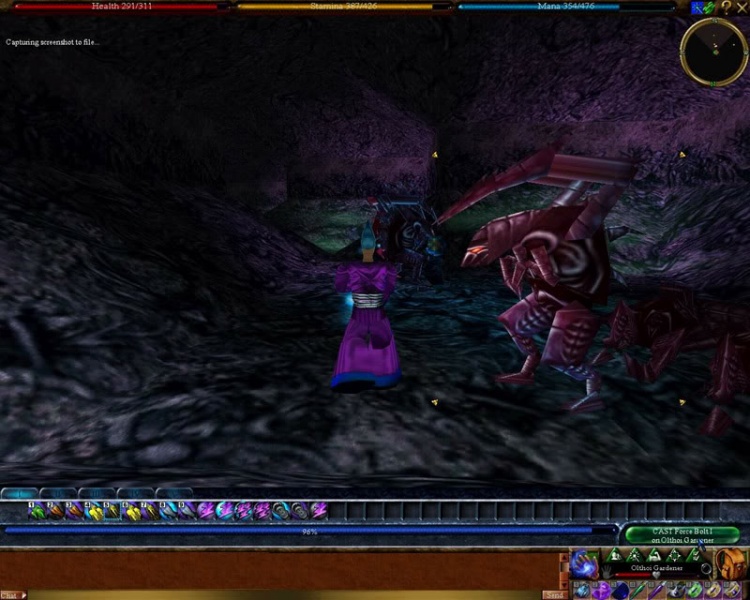
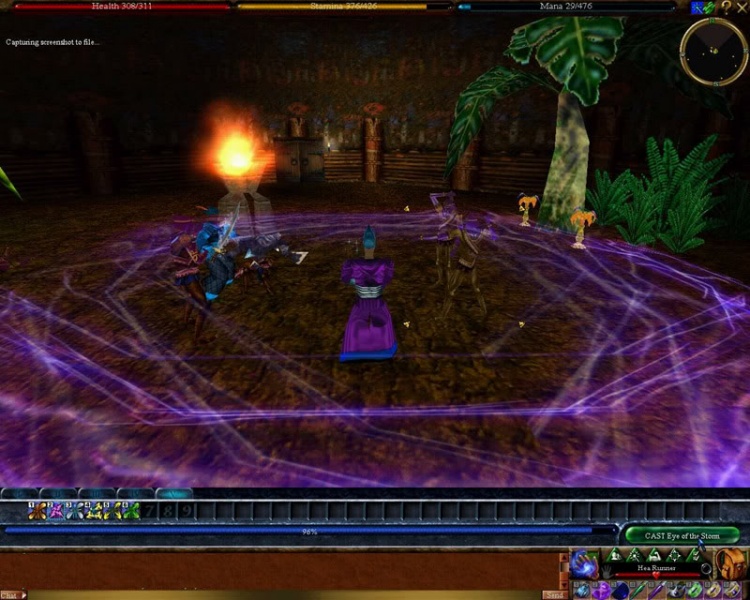
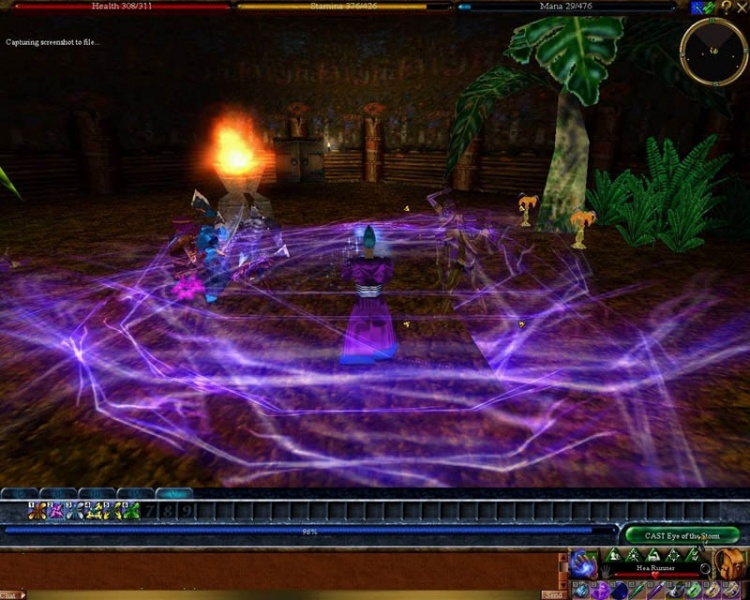
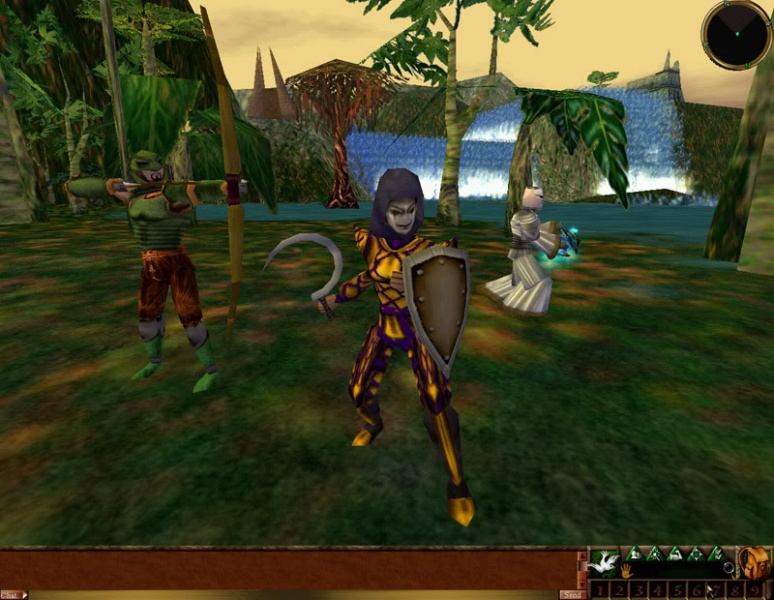
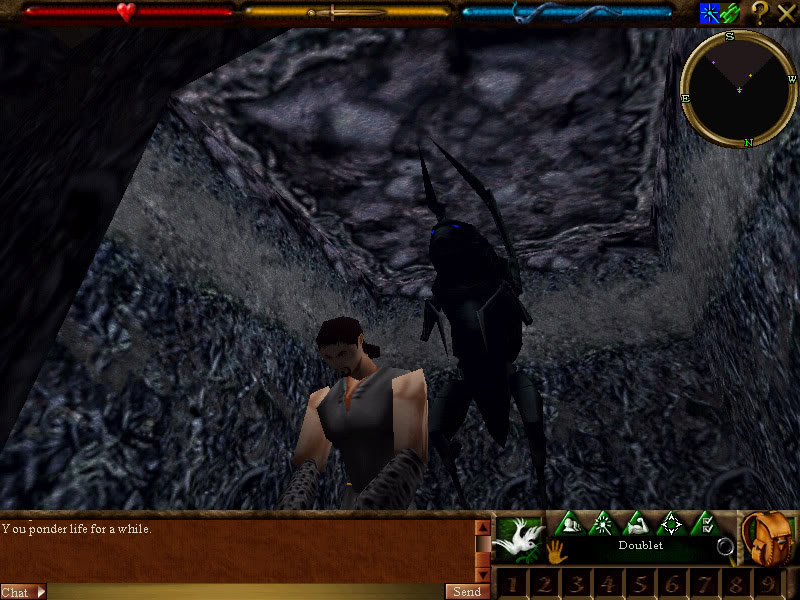
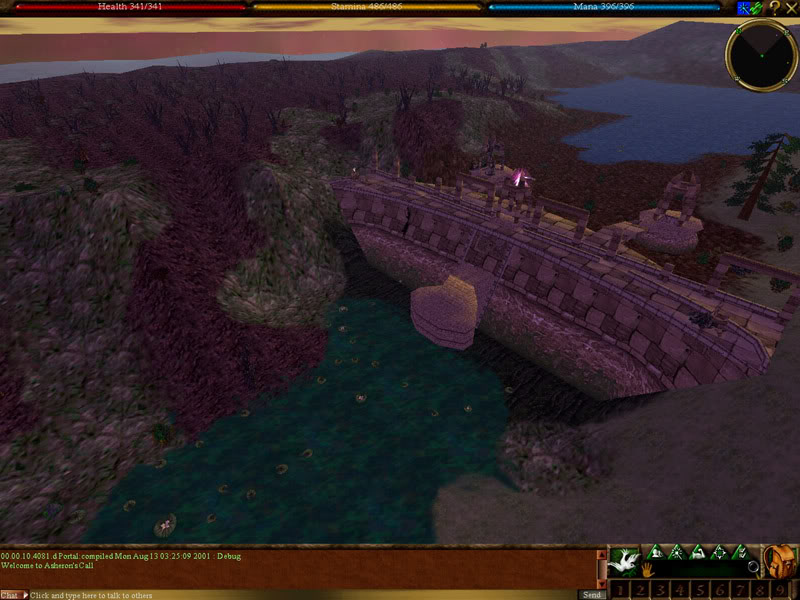
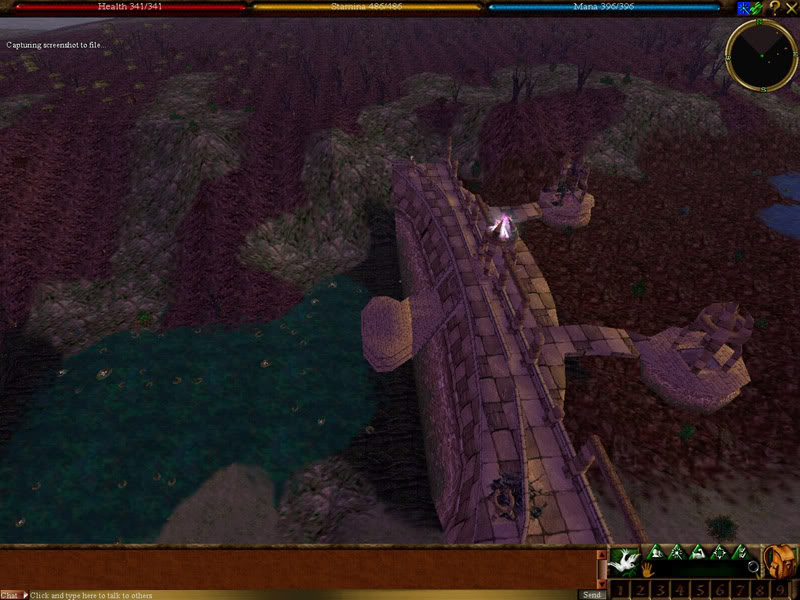
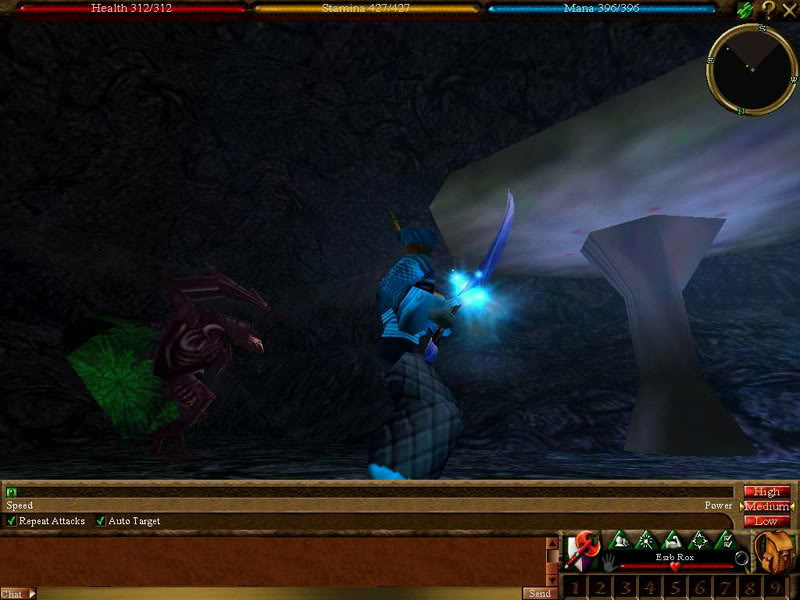
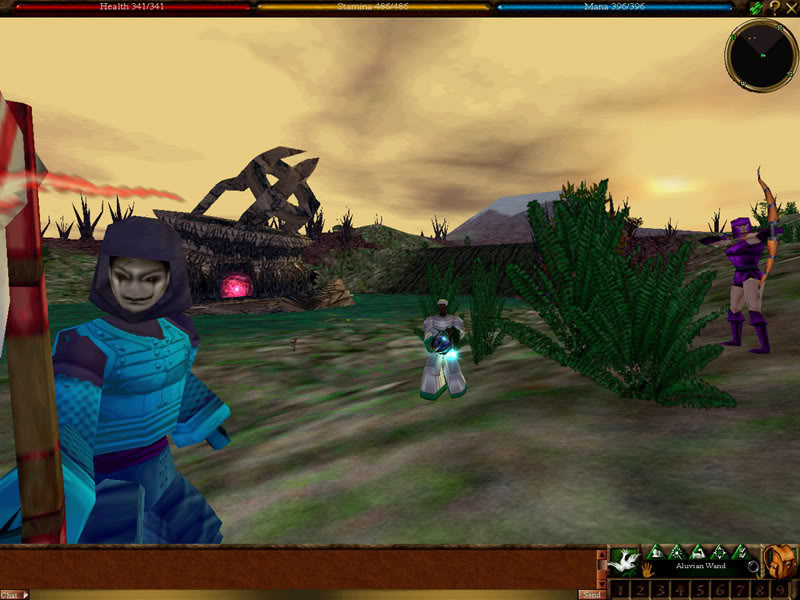
Homestead
The dream collapsed into stale night sweat and twisted sheets.
Asaina blinked. The tawny light of Alb’arel fell through the open window, coating the simple wooden furnishings of her room with warm, lustrous wax. The cool night air of the badlands wound itself through the room, rustling the scrolls and bringing in the gentle susurration of Zaikhal’s fountain.
Softly, again, came a rap on her door.
She stood, gathering the blanket around herself, and shuffled across the book-strewn floor. “Yes, yes. Coming,” she grumbled, pushing sleep-wild hair away from her eyes.
The Sho girl in the hall, perhaps sixteen years old, gulped and bowed deeply, holding it until it seemed certain she would topple to the floor at Asaina’s feet. Moonlight glittered off the polished obsidian chopsticks holding the sable hair off the back of her neck. “My sincere apologies for waking you at such an hour, Mistress al-Arqis. I have been sent by my master, Celdiseth. He wished me to give you a most urgent message.”
Asina folded her arms crossly, but forced a smile. “Worry not, child. I’m used to that old crank’s ways.” The girl’s eyes widened at the word. “What is your name?”
“Hoshino Kei, mistress.”
“Have you walked far, Kei? I could make you some tea.”
Her mouth worked, but nothing came out. Then, “Portal magic, mistress.”
“Ah. Well, tell me your message.” Asaina walked back across the floor and perched on the edge of her bed, folding her hands in her lap.
Kei looked down and began to recite in low, even tones. “Master Celdiseth wishes to say that the Monster of the Labyrinth has just completed her studies, and called for a meeting of the Archmages and certain powerful nobles. Celdiseth desires that a representative of the Arcanum be present, for he expects what is said will be of great interest to all sages, and yet would not become common knowledge otherwise.
“He has chosen you because you are aware of the Monster’s illicit appropriation of texts recovered by the Arcanum from the archives of Xarabydun. He also knows that you expressed disapproval of this, and were reprimanded by other members of the Arcanum as a result. He therefore believes that which will be whispered tonight must be heard by you. He yet recalls being impressed by your persistence in warning of the sudden frost that presaged the discovery of Old Frore.” The girl bowed again, and spoke in her normal voice. “This is the message I was given, Mistress.”
Asaina rose and walked to the window. Below, auroral waves of sand shimmered and drifted across the stones of the courtyard. So. This was the night the first age of humanity in Dereth would come to an end. The night nomadic wandering gave way to settlement, to true civilization.
The greatest schemer of Ispar was prepared to move, having at her side the lost secrets of Empyrean magic. “The Monster of the Labyrinth.”
Nuhmudira, scholar of Tirethas.
The door wearily creaked open at her touch, shushing the sound of excited discussion into a stern, disapproving silence. Nine faces studied Asaina, including–
“Queen Strathelar,” she curtseyed.
The tall blond woman brushed aside the courtesy with a tired wave of her hand. “Walim al-Arqis. I see Master Celdiseth’s messenger found you.”
Asaina could feel Kei stiffening into another bow and stepping back. Poor child. She seemed very much a country girl out of her depth. She turned to look back at her. “My thanks for guiding me here, Apprentice.”
Kei murmured something appropriate and continued to retreat, holding her bow and looking intently at the floor. Behind her, a boy with straw blond hair skipped out of the path of her posterior. His eyes were very blue, and very wide at the sight of the elegant apprentice. That is the prince? Asaina smiled to herself. The very image of his mother; lanky and pale, not at all like dark and muscular Thorsten. Kei straightened and noticed him in the shadows along the wall.
“Erh, g’morning,” he said, blushing furiously.
“Greetings, Prince Borelean,” Kei said, formally.
“Dinna call me that,” he scowled. “Talk ta me like a person.” Yes, definitely his mother’s son.
“Why are you here, Scholar al-Arqis?” The voice crackled like old, dry sticks. Asaina turned back to the table. There, in the candle-lit twilight at the end, lurked the old spider. “Have you no scrolls to read, no shelves to dust, that you should meddle in the affairs of those above your station at such an hour?” The hairs on the back of Asaina’s neck went rigid with indignation. A retort coiled in her mouth-
“I sent for her, Nuhmudira,” Celdiseth growled.
The other woman unfolded herself from her chair. She was old as dust and stone, her hair spider web silver, her hands gnarled as the mage’s staff she leaned upon. “You are not welcome.” The intensity of her black eyes nearly drove Asaina back a step.
“She is welcome,” Strathelar said simply, and nothing more. The spider, ever a political beast, bowed to the queen, and settled herself back in the cobwebs of her chair. The chair from which so many plots had spun. The chair that had decreed no human settlements would grow until they could be defended from the greatest enemy of all.
“As I was saying,” Nuhmudira said. “This art I have learned from the texts of Xarabydun was used by the Seaborne Empire to keep their homes safe from intrusion. It is therefore proof against their own arts. With it, we may bind a parcel of land to an owner, who may bar entry to any he or she wishes to keep out.
“At long last,” the spider breathed, “we have a way to hold this land that is proof against the might of the Empyrean themselves! We are free now to colonize this world, safe from the threat of their return.”
“Hogwash!” Celdiseth chortled.
“How would you propose we begin to distribute this boon?” Jaleh al-Thani, bey of Ayan Baqur, loomed over the table, a covetous emerald gleam in his eye.
“Slowly, of course. Haste only leads to error. That is the principle behind every decision I have made in my life. One thing is certain, whether or not our homes are safe against Asheron’s people.”
“They were never his people,” the queen said, softly.
“Whether or not they are safe against the Empyrean,” Nuhmudira amended, “we will have to venture from them sometimes. One day they will return from their diaspora. There will be a war then, between the old residents of this island, and the new.” She looked around the table, plainly daring anyone to disagree. The queen sucked on her lower lip and said nothing, her eyes distant seas. “We must win, even against such overwhelming power.” The old woman’s eyes burned. “Dereth is our home now. We have bled for it. All my efforts here have been towards solving this problem.”
“We will need material to pursue this war,” she continued. “Spells. Weapons. Armor. There are many things in Dereth free for the taking; leavings of the empires that once thrived on this land, and the resources of the species that finally destroyed them. We shall call upon the entire human population of Dereth to serve as our provisioner.”
“The Keepers that bind the land shall ultimately answer to the mages and nobles assembled at this table. We will own the land. For one to tenant it, they must provide our chosen representatives with whatever relics we require. We will post these people in every town of Dereth. They will provide the special items that the Keepers will recognize as payment.
“The war material the representatives collect will be held in trust by the Arcanum,” she nodded at Asaina, “until that day, may it be long in coming, that it is needed.”
“And how shall we begin?” Jaleh asked, looking somewhat disappointed.
“First, we should build a single settlement. It has been some time since our carpenters plied their craft on such a scale. They will need practice, and we will need to prove the concept. Some of the arts involved are beyond the ability of Isparian craft. The Keeper, for example. They rely on Empyrean demiurgy. We must make sure we can make them function properly. It will take several months before we can rest assured they operate as we desire.
“As time passes, we will continue to build. Until we have sufficient numbers of houses constructed, I believe we should refrain from selling any. There will be, I daresay, some demand for them. Better to avoid riots. We must use our strength to fight the Empyrean, not each other.”
“Oh come now,” Celdiseth said grumpily. “Surely you don’t believe this poppycock. This was a spell used by the Empyrean to prevent burglary. Does anyone here seriously believe it will be any use against the Hieromancers of the Seaborne Empire? The mana-bombards? The area dispels? Do you think the Cathedral of Ithaenc would lie in ruins if it was?” He turned to Asaina. “And you, fellow of the Zaikhal Arcanum? What do you think of this?”
In the mornings, the smell of her mother’s kitchen garden had filled their house as the sun warmed the fragrant leaves. She awoke every day to intoxicating air, rich with saffron and cinnamon, and mint bought from far Aluvia. As the sun climbed the earth-colored walls, and splashed the ember patterns of the tapestry she had hung on the wall herself, she would pull the blanket tight around herself and imagine the roots of home stretching deep into the earth.
As she grew older, her mother taught her to weed the garden, to fetch water from the well and shake it gently over the plants. To pick the aphids off the leaves. When the choicest time to harvest them was, and how to tie the leaves in a bundle to hang from the rafters to dry. To carefully brush the dust and spiders from the garden demon, with its bulbous eyes and ridiculous hat. “One day,” her mother told her, “this garden will be yours to keep, and then your daughter’s, and then hers.”
“Yuck!” she’d cried. “I don’t want to tend the garden forever, mother. I want to travel to distant lands, and learn magic.”
Asaina smiled, and blinked a few times. A quote from the poet ibn Salayyar came to her.
“It may be bitter fruit we pluck. Yet what else is there to eat?” She faced Celdiseth’s disapproving eye. “I would like a kitchen garden, Master Celdiseth, whether the Empyrean return or not.”